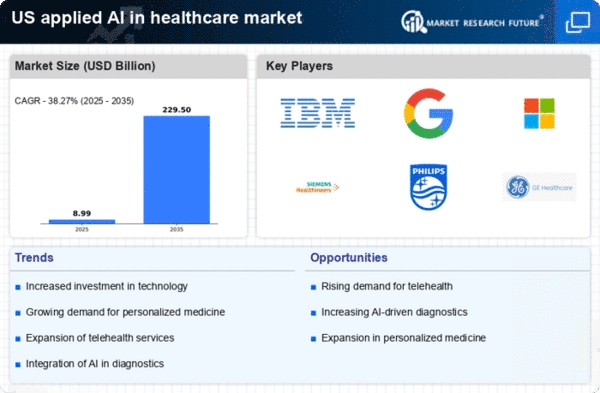Enhancements in Diagnostic Accuracy
the applied AI in healthcare market is witnessing substantial advancements in diagnostic accuracy., primarily due to the implementation of AI algorithms in medical imaging and pathology. These technologies have demonstrated the ability to analyze images with a precision that often surpasses human capabilities. For instance, AI systems can identify anomalies in radiological images with an accuracy rate exceeding 90%, which is crucial for early disease detection. This improvement in diagnostic processes not only enhances patient outcomes but also reduces healthcare costs associated with misdiagnoses. As healthcare providers increasingly adopt AI-driven diagnostic tools, the applied ai-in-healthcare market is likely to expand, reflecting a growing reliance on technology to support clinical decision-making.
Regulatory Support for AI Innovations
the applied AI in healthcare market is benefiting from increasing regulatory support aimed at fostering innovation in AI technologies.. Regulatory bodies are beginning to establish frameworks that facilitate the approval and integration of AI-driven solutions in clinical settings. For instance, the FDA has introduced guidelines that expedite the review process for AI-based medical devices, which encourages companies to invest in research and development. This supportive regulatory environment is likely to accelerate the introduction of new AI applications in healthcare, enhancing the overall market landscape. As a result, the applied ai-in-healthcare market is expected to experience robust growth, driven by the influx of innovative solutions that improve patient care and operational efficiency.
Rising Demand for Personalized Medicine
the applied AI in healthcare market is experiencing a notable shift towards personalized medicine., driven by the increasing demand for tailored treatment plans. This trend is largely influenced by advancements in genomics and biotechnology, which enable healthcare providers to customize therapies based on individual patient profiles. As a result, the market for personalized medicine is projected to reach approximately $2.4 trillion by 2025, indicating a compound annual growth rate (CAGR) of around 10.5%. The integration of AI technologies facilitates the analysis of vast datasets, allowing for more accurate predictions of treatment outcomes. Consequently, this driver is expected to significantly enhance patient care and optimize resource allocation within the healthcare system, thereby propelling the growth of the applied ai-in-healthcare market.
Increased Focus on Operational Efficiency
the applied AI in healthcare market is significantly influenced by the growing emphasis on operational efficiency. within healthcare organizations. AI technologies are being deployed to streamline administrative tasks, optimize scheduling, and manage patient flow, which can lead to substantial cost savings. For example, AI-driven solutions can reduce patient wait times by up to 30%, thereby improving overall patient satisfaction. Additionally, the automation of routine tasks allows healthcare professionals to focus more on patient care rather than administrative burdens. This shift towards operational efficiency is expected to drive the adoption of AI solutions, ultimately contributing to the growth of the applied ai-in-healthcare market as organizations seek to enhance productivity and reduce operational costs.
Growing Investment in Health Data Analytics
the applied AI in healthcare market is increasingly shaped by the growing investment in health data analytics., which is essential for deriving actionable insights from vast amounts of healthcare data. Organizations are recognizing the value of leveraging AI to analyze patient data, identify trends, and improve clinical outcomes. The market for health data analytics is projected to reach $50 billion by 2026, with a CAGR of approximately 23%. This surge in investment is driven by the need for data-driven decision-making in healthcare, as providers seek to enhance patient care and operational efficiency. Consequently, the applied ai-in-healthcare market is likely to expand as organizations adopt advanced analytics solutions to harness the power of data.

















